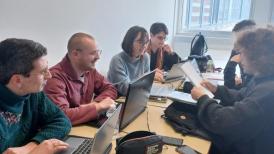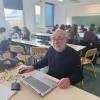
In February 2022, a working group co-chaired by the Climatologist, Jean Jouzel and Luc Abbadie, Professor of Ecology, submitted a report to the Ministry of Higher Education and Research (MESR) on raising awareness and providing training on the challenges of the ecological transition and sustainable development in higher education. Based on these recommendations, Minister Sylvie Retailleau announced in October 2022, the expansion of this training, and, in particular, the offering of new courses in the curricula of all students, as well as the adaptation of existing courses in the various themes of the curriculum. Specific courses on the ecological transition will have to be provided to students by 2025 at the latest.
For Edouard Bouin, Lecturer and General Administrator of the organization, Agir pour le climat, it is essential to integrate students in the development of this strategy to be deployed. In January of 2023, he set up a workshop at Rennes 2 University "to help implement an element of this strategy, [...] which aims to get students to understand and implement tools for data collection, investigation, observation, analysis and formulation of action proposals.

Édouard Bouin during the workshop
Divided into small working groups, approximately 20 first year Masters students in geography have one semester to take stock of their classmates' knowledge of the actions carried out on campus and to propose an analysis and recommendations. They will develop an online questionnaire and will be received by Rennes 2 personnel such as Julie Clément, Head of the Sustainable Development mission, and Nadia Dupont, Vice-President of Teaching and Training, who attended the presentation of the report.
"The first session showed that despite an interest and a knowledge base on the subject, the data, definitions, acronyms, etc. remain approximate. One of the elements raised in the report is precisely the loss of knowledge on these topics between secondary school, where courses exist, and higher education," explains Edouard Bouin. One of the groups is therefore working on this very point: "We looked at textbooks from the 6th to the 12th grade, and at first glance we noticed that there is no chapter dedicated to environmental issues, only cross-cutting elements addressed in passing. We also noticed that the terms are quite general, for example, they talk about "sustainable development" without really specifying what it covers."
"As future geographers, it is precisely this work that we will have to do tomorrow", notes one of the participants. All of them intend to work in a field related to environmental protection (hydrology, urban revitalization, habitat renewal, mobility, etc.) and express the wish to enrich their knowledge with practical examples and concrete cases, in order to "feel legitimate". One student stated, "I expect this work will be able to offer everyone technical knowledge on the subject without being defeatist and by showing what it is possible to do at one's own scale." They will present the first elements of their work during the Sustainable Development Week, which will take place from March 27 to 31 on the Villejean campus.



